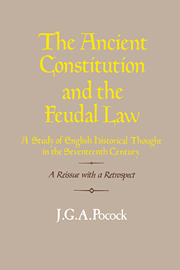 The Ancient Constitution and the Feudal Law
The Ancient Constitution and the Feudal Law Book contents
- Frontmatter
- Contents
- Preface
- Preface to the First Edition
- Part One The Ancient Constitution and the Feudal Law
- I Introductory: the French Prelude to Modern Historiography
- II The Common-law Mind: Custom and the Immemorial
- III The Common-law Mind: the Absence of a Basis of Comparison
- IV The Discovery of Feudalism: French and Scottish Historians
- V The Discovery of Feudalism: Sir Henry Spelman
- VI Interregnum: the Oceana of James Harrington
- VII Interregnum: the First Royalist Reaction and the Response of Sir Matthew Hale
- VIII The Brady Controversy
- IX Conclusion: 1688 in the History of Historiography
- Part Two The Ancient Constitution Revisited: a Retrospect from 1986
- Index
III - The Common-law Mind: the Absence of a Basis of Comparison
Published online by Cambridge University Press: 18 November 2009
- Frontmatter
- Contents
- Preface
- Preface to the First Edition
- Part One The Ancient Constitution and the Feudal Law
- I Introductory: the French Prelude to Modern Historiography
- II The Common-law Mind: Custom and the Immemorial
- III The Common-law Mind: the Absence of a Basis of Comparison
- IV The Discovery of Feudalism: French and Scottish Historians
- V The Discovery of Feudalism: Sir Henry Spelman
- VI Interregnum: the Oceana of James Harrington
- VII Interregnum: the First Royalist Reaction and the Response of Sir Matthew Hale
- VIII The Brady Controversy
- IX Conclusion: 1688 in the History of Historiography
- Part Two The Ancient Constitution Revisited: a Retrospect from 1986
- Index
Summary
COKE'S mind, it is clear, was as nearly insular as a human being's could be. He saw the law he idolized as the immemorial custom of England, and he imagined it as being immemorial purely within the island. For this reason his doctrine of ancient law should be sharply distinguished from another contemporary belief, at this time spreading in popularity: that the liberties of western Europe, including the English law and parliament, were derived from the ‘Goths’, as the early Germans were then termed. An American scholar, S. L. Kliger, has lately shown that this belief was held in England, and in common-law circles, from a time as early as 1567, when Rastell seems to have adopted it; but it is not to be found in Coke. When the latter quotes from Tacitus' Germania, ever a favourite work with believers in early Teutonic liberty, it is ‘concerning the Antiquity of descents which the Germanes had agreeable with the ancient Laws of the Britons, continued in England to this day’. The purely insular character of his ideas could hardly appear more clearly; the law is immemorial in Britain and ancient Continental law merely happens to agree with it. Moreover, as we have seen, when he has traced a law back to the time of some ancient king, whether Alfred or Arthur, he never fails to add that this king was merely confirming what was already immemorial, a habit scarcely reconcilable with the theory that the law was imported by Hengist.
- Type
- Chapter
- Information
- The Ancient Constitution and the Feudal LawA Study of English Historical Thought in the Seventeenth Century, pp. 56 - 69Publisher: Cambridge University PressPrint publication year: 1987
